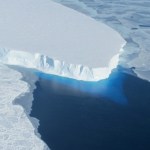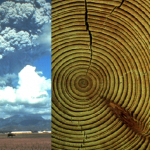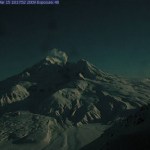volcanoes
I just did an interview on Green Diva Radio, and talked about a lot of climate change science news. For those who want to see the sources, here is a quick summary:
On Friday, NASA and NOAA are expected to announce that 2014 was the hottest year on record. I had been planning to write an extensive blog post going into all sorts of details about how that works, how they calculate it, etc. But then the people at Climate Nexus wrote a post that would have blown mine out of the water with the detail and informtation provided in it. Go here to read this excellent post: 2014: Putting The Hottest…
Mark Your Cosmic Calendar: 774/775
One wonders if anyone felt it. Did Charlemagne feel it as he led his forces across Pagan Saxon Westphalia, knocking down Irminsuls and making everyone pretend to be Christian or else? Did the people of Bagdad, just becoming the world’s largest city, notice anything aside from their own metro-bigness? Did the Abbasid Caliph Muhammad ibn Mansur al-Mahdi have the impression something cosmic was going on that year, other than his own ascendancy to power? Or was it mainly some of the Nitrogen molecules in the upper atmosphere that were changed, not forever but…
In her laboratory, scientist Elizabeth "Liz" Cottrell uses sophisticated equipment to simulate the extreme conditions found deep below volcanoes - creating pressures equivalent to the center of the Earth and temperatures hotter than the sun. Her experiments at the micron scale are shedding light on the processes that have shaped our planet.
Liz is a geologist at the Smithsonian Institution's National Museum of Natural History where she directs its Global Volcanism Program as well as serving as a curator and research geologist in the Department of Mineral Sciences. Her research involves…
Mark Pendergrast writes: To kick off this book club discussion of Inside the Outbreaks, I thought I would explain briefly how I came to write the book and then suggest some possible topics for discussion.
The origin of the book goes back to an email I got in 2004 from my old high school and college friend, Andy Vernon, who wrote that I should consider writing the history of the EIS. I emailed back to say that I was honored, but what was the EIS? I had never heard of it. I knew Andy worked on tuberculosis at the CDC, but I didn't know that he had been a state-based EIS officer from 1978…
The idea that deglaciation could affect vulcanism is not new. For anyone who thinks that linking climate change to volcanic eruptions is a prime example of over-the-top alarmism, consider this look at the subject in New Scientist in 2006:
Although these forces on the Earth's crust are subtly changing all the time, their effects are most obvious at times of major or sudden climate change, such as at the beginning and end of an ice age or during the period of climate change we are expected to experience over the coming centuries. As the balance changes between the stresses acting on the crust…
When I was designing my summer session class, I ran into a problem. If I really wanted my students to achieve the course goals, they would need to spend a lot of time on a computer. In a 3-times-a-week lecture course, I might expect them to do that work outside of class, but we were going to be meeting for two hours a day, four days a week - they wouldn't have much time between classes (especially if they were taking other classes and working). And I didn't want to lecture for two hours a day. So, if I wanted them to get in-class practice doing things that related to their goals, I needed to…
Earlier this month, a group of biologists, oceanographers, volcanologists, geophysicists, and other scientists from many institutions took a trip to the area between Fiji, Samoa, and Tonga to look at actively erupting submarine volcanoes, including a backarc spreading ridge (never directly observed before!) and a new arc volcano.
And they had a blog.
So if you want insights into the experiences of marine geologists in the field... well, you can read for yourself. (Teaser: one post is titled "We Thought We'd Seen It All".) Science in action. So cool. Or hot, in this case.
(Thanks to the Lab…
I should have finished designing the new version of my disasters class. I've been thinking about it forever. But then I was trying to get a paper written, and then I went to a conference, and then there were senior thesis presentations and end-of-semester grading and a six-year-old's birthday, and, well...
Yes, I am frantically trying to get a syllabus ready for class on Monday.
I've got three more days (though they include a discussion with my soon-to-graduate thesis student, graduation, and a birthday party, so it can't be non-stop syllabus work). That means that, although I should be…
Geologists have been keeping a close watch on the volcanic activity brewing at Mount Redoubt, the 9,000 foot (2,700 m) volcano found in Alaska's Aleutian Range. In response to the eruption at Redoubt on Thursday morning that released a 65,000 foot (20,000 m) ash column, the Alaska Volcano Observatory raised its Volcano Alert level to "Warning" and its Aviation Alert Level to "Red," both of which are the highest possible categorizations. ScienceBlogger Erik Klemetti from Eruptions is keeping close watch on Redoubt, so pop over to his blog for explosive updates!
Related ScienceBlogs Posts:…
On Monday, airline passengers were the first to observe the eruption of the just-barely-above-the-water volcano that forms the islands of Hunga Tonga and Hunga Ha'apai, in Tonga. Three days later, a magnitude 7.9 earthquake occurred on the Tonga trench.
Was the timing of these two events just coincidence?
Yes.
Why do I think the events were unrelated? Well:
Earthquakes happen all the time. Thankfully for Tongan residents, I am using a geological definition of "time" here, but still: A major earthquake on a major plate boundary does not require any special explanation.
The earthquake was a…
On Monday, airline passengers were the first to observe the eruption of the just-barely-above-the-water volcano that forms the islands of Hunga Tonga and Hunga Ha'apai, in Tonga. Three days later, a magnitude 7.9 earthquake occurred on the Tonga trench.
Was the timing of these two events just coincidence?
Yes.
Why do I think the events were unrelated? Well:
Earthquakes happen all the time. Thankfully for Tongan residents, I am using a geological definition of "time" here, but still: A major earthquake on a major plate boundary does not require any special explanation.
The earthquake was a…
A recent influx of geobloggers on ScienceBlogs has brought rocks, mountains, and their fiery relatives volcanoes into the spotlight. Whether they're talking about unusual uses of earthquake jargon, volcanic eruptions in the South Pacific, or their fantasy geology curriculum for undergraduates, these bloggers stay down to earth. Remarked veteran ScienceBlogger Chris Rowan of Highly Allochthonous, "All the biomedical types around these parts should wake up and start realizing that the future is hammer-shaped."
Related ScienceBlogs Posts:
The "what should a geology major know" meme
New…
I've been blogging my way throug the redesign of my upper-level general education course, "The Control of Nature," using a course design tutorial from SERC. I've talked about what's gone wrong in the past, about who my students are and what they need from the class, and about my tentative goals for the class. I've been mulling over the problem (and also going back to classes after spring break), and I've finally worked through the next part... the course plan.
When it comes time to put a course together, I've got some bad habits. For instance, when I don't have any good ideas, I start by…
Thumbing a nose at Bobby Jindal, we enthusiastically welcome ScienceBlogs newest addition, Eruptions, written by Erik Klemetti. Erik is a post-doc in igneous petrology, which means he studies how the rocks under volcanoes work. Near daily ]posts on Eruptions profile volcanoes in the news, explaining the science behind the eruptions in terms that non-rock heads can understand. At his old digs, he also did some fantastic analysis of the politics and sociology of relocating an entire town from the danger zone around Chaiten volcano. I'm looking forward to more great posts from Erik, and it looks…
I'm rethinking one of my courses, an upper level general education course called "The Control of Nature." I've been blogging my way through the course redesign process, starting with past problems with the course and with my various practical constraints (class schedule, physical space, student background). I'm using an online tutorial to guide me through the process, and now I'm finally moving towards thinking about the course itself.
Before I actually start redesigning lectures and in-class exercises and assignments, I need to figure out what I want students to be able to do when they get…
Erik Klemetti's blog Eruptions has just joined ScienceBlogs. Yay!
Now you know that geology is the hottest science. (Well, except maybe for solar physics, but they go to American Geophysical Union meetings too.)
I've got a course that (IMO) is broken, and I'm working on fixing it.
I've been teaching a course called "The Control of Nature" (after John McPhee's book) for 16 years, after thinking of the idea on my way home from my first academic job interview. (Yes, that was a bad time to come up with an answer to a question like "what other class could you teach?" No, I didn't get that job.) I've taught it as an intro course for non-majors and as an upper-level interdisciplinary general education class, and I had plans, once, to adapt it for a freshman seminar and for a large-lecture gen ed class. It'…
There has been a lot of cool stuff posted while I was getting this blog set up. From my Google Reader shared items:
Exotic rocks. There's an art exhibit in Oakland, California, that includes metamorphic rocks from Maine. Why? Because the schists sound like xylophone keys when they're struck. I knew there was a reason why I liked hitting metamorphic rocks with my hammer...
Fermi paradox meets the timescale. Why haven't we been visited by intelligent life? Well, if we had been visited by intelligent life sometime during Earth's 4.6-billion-year history, odds are that there wasn't any…
The consensus piece of apologetics for Jindal's anti-USGS remarks appears to be to claim that even though volcano monitoring is, of course, a worthwhile investment, it is not economically stimulating, and therefore does not belong in the stimulus bill.
To claim that this is what Jindal was actually trying to say requires a phenomenally over-generous interpretation of his speech. But forget what Jindal did or did not say, or mean to say, or imply - his big flop is yesterday's news now. Considering the argument that volcano monitoring does not belong in the stimulus bill on its own merits... I…
When will the madness end? When the Republicans dry up and blow away, of course.
In the Republican response to Obama's State of the Union 2.0 address, by Bobby Jindal, governer of Louisiana, we heard this:
"Instead of monitoring volcanoes, what Congress should be monitoring is the eruption of spending in Washington, D.C.,"
The reason why volcanoes have been picked out of some speech writer's anal sphincter zone is because they erupt and they wanted the metaphor. Or because Jindal believes he has no volcanoes in his state (but he would be wrong) or because of some other rhetorical reason…



